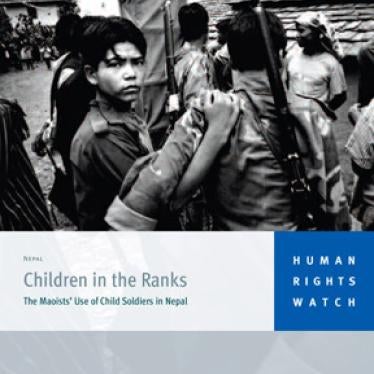(New York) - Nepal’s Maoist armed forces should immediately begin releasing the thousands of child soldiers in their ranks and cease recruiting more children, Human Rights Watch said in a report released today.
The new 72-page report, “Children in the Ranks: The Maoists’ Use of Child Soldiers in Nepal,” describes how the Maoists have continued using child soldiers, and even recruited more children, despite signing a Comprehensive Peace Agreement with the Nepali government on November 21. The peace agreement commits both sides to stop recruiting child soldiers.
The report, which is based on interviews with former child soldiers and Nepali and international monitors, documents how children as young as 14 served on the front lines, received weapons training, and carried out crucial military and logistical support duties for the Maoists.
“The Maoists should let the children go,” said Sam Zarifi, Asia research director at Human Rights Watch. “The peace agreement explicitly forbids the use of child soldiers, and complying with this will be a key test of the Maoists’ good faith to uphold the accord.”
Nepali and international observers believe that up to 4,500 Maoist soldiers were under 18 when they were recruited to fight in a decade-long civil war that has claimed more than 13,000 lives.
The Maoists, however, have consistently denied recruiting or using child soldiers. When questioned directly by Human Rights Watch on November 18, the Maoist leader Prachanda responded by repeating the Maoists’ official line: “We have never taken the policy to recruit children into our army. But in our military, they feed some children whose parents were martyred.”
Maoist commanders at the local level have responded identically, or blamed the use of child soldiers in the ranks on lack of discipline among local militias.
“Only when the Maoists, from the top leadership down to cadres on the ground, admit how many children are in their ranks and begin releasing them, can Nepalis be confident that their children will no longer be recruited for combat,” said Zarifi.
Human Rights Watch’s report documents how the Maoists have used a variety of techniques for recruiting children. Maoists have kidnapped individual children, have abducted large groups of children from school, and have used propaganda campaigns to attract children as “volunteers.” These practices were systematically implemented over several years and throughout areas under Maoist control.
The Maoists’ practice of recruiting child soldiers, often forcibly, has caused widespread fear among Nepalis and caused many families to flee their homes.
In areas of the country under their firm control, the Maoists instituted a “one family, one child” policy that forced at least one child from each family to join the Maoists. When boys ran away or were sent away from home, young girls were recruited.
“The Maoists’ use of child soldiers violates international law,” said Jo Becker, child rights advocate at Human Rights Watch. “Children under 18 should not be allowed in the ranks, regardless of whether they were recruited by force or through a propaganda campaign.”
Since the ceasefire that came into effect on May 3, no children have been involved in combat. But the Maoists continued recruiting children up to the signing of the peace agreement and, with less frequency, have continued to recruit children even afterwards.
The report also documents the failure of the Nepali government to attend to the needs of child soldiers. Until the recent ceasefire, Nepali security forces treated children accused of cooperating with the Maoists with the same brutality that they used against adults suspected of Maoist ties. The government has not yet created a system to assist child soldiers who leave Maoist forces.
Human Rights Watch called on Nepal’s major international donors – such as the United States, the European Union, India and the United Nations – to provide technical and financial assistance necessary for reintegrating former child soldiers into normal life.
“Release from the Maoists’ ranks is only the first step for thousands of children who have missed out on their education or learning how to earn a living,” Becker said. “The Nepali government and international supporters have a responsibility to help these children.”
Since 2002, the Maoists have been named in three consecutive reports by the UN secretary-general to the Security Council as violating international standards prohibiting the use and recruitment of child soldiers. On February 9, a UN Security Council working group on children and armed conflict, is scheduled to consider reported violations against children by all parties to Nepal’s armed conflict. The working group will make recommendations for Security Council action.
“The Security Council should make it clear to the Maoists that they must immediately end their practice of using child soldiers,” Becker said. “This would remove a source of agony for thousands of Nepali families and boost the likelihood of a lasting peace in Nepal.”







